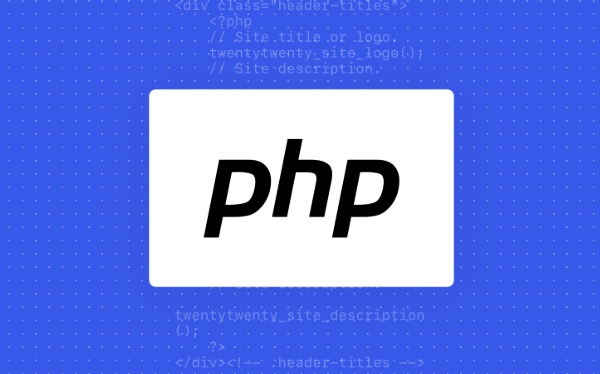 Backend Development
Backend Development
 PHP Tutorial
PHP Tutorial
 Mastering Variable Scope: `global`, `local`, and `static` Explained
Mastering Variable Scope: `global`, `local`, and `static` Explained
Mastering Variable Scope: `global`, `local`, and `static` Explained
Jul 30, 2025 am 04:43 AMThe three variable scopes in PHP are global, local, and static: 1. Use global to access variables from outside a function, but prefer passing parameters to improve testability; 2. Local variables are default inside functions, exist only during function execution, and prevent side effects; 3. Use static to preserve a local variable’s value between function calls, ideal for counting or caching, but avoid for shared state or large data. Always favor local scope, limit global use, and document static usage clearly to write clean, maintainable code.

Understanding variable scope is essential for writing clean, predictable, and bug-free code—especially in languages like PHP, where global, local, and static keywords directly influence how variables behave across different contexts. Let’s break down each of these scopes in practical terms, so you can master when and why to use them.

What Is Variable Scope?
Scope determines where in the code a variable can be accessed. A variable might be available everywhere, only inside a function, or persist between function calls. The three key players here are:
-
global— access variables from the global scope inside functions -
local— variables defined inside a function (default behavior) -
static— preserve a local variable’s value between function calls
Let’s explore each.

1. global: Accessing Variables Outside the Function
By default, functions cannot access variables declared outside of them—even if those variables are defined in the global scope.
$color = "blue";
function showColor() {
echo $color; // This won't work!
}
showColor(); // Output: (nothing, and a warning)To fix this, use the global keyword:

$color = "blue";
function showColor() {
global $color;
echo $color; // Now it works!
}
showColor(); // Output: blue? How it works:
global $colortells PHP to link the local$colorinside the function to the$colorin the global scope.
You can also use $GLOBALS, an associative array that holds all global variables:
function showColor() {
echo $GLOBALS['color'];
}This avoids global and is often preferred for clarity and testability.
? Use global when: You need to read or modify a global variable inside a function.
?? But be cautious: Overusing global variables makes code harder to debug and test. Try to pass values as parameters instead.
2. local: The Default Function Scope
Any variable declared inside a function is local by default—it only exists within that function.
function setCounter() {
$count = 1;
echo $count;
}
setCounter(); // Output: 1
echo $count; // Error! $count doesn't exist here.Local variables are created when the function starts and destroyed when it ends.
? Use local variables for: Temporary data, calculations, or inputs that don’t need to persist or be shared.
They’re safe, isolated, and prevent unintended side effects.
3. static: Remember Values Between Calls
Sometimes you want a local variable to remember its value the next time the function runs. That’s where static comes in.
function increment() {
static $count = 0;
$count ;
echo $count . "\n";
}
increment(); // Output: 1
increment(); // Output: 2
increment(); // Output: 3Without static, $count would reset to 0 every time.
? Key point:
static $count = 0;runs only once, the first time the function is called. On subsequent calls, the assignment is skipped, but the value is retained.
? Use static when:
- You’re counting how many times a function was called
- Caching a computed value within a helper function
- Building simple generators or stateful utilities without objects
? Don’t use static for:
- Shared state across unrelated functions (use classes instead)
- Large data—you’re keeping memory alive longer than necessary
Quick Comparison Table
| Keyword | Scope | Persists Between Calls? | Accessible Outside Function? |
|---|---|---|---|
global | Global | Yes (if global exists) | Yes |
local | Function-only | No | No |
static | Function-only | Yes | No |
Best Practices & Common Pitfalls
Avoid
globalwhen possible
Instead of relying on global state, pass variables as parameters:function showColor($color) { echo $color; }Initialize
staticvariables carefully
The initial value is set only once. Don’t use expressions with side effects.Don’t confuse
staticwith class static properties
They’re related but different. Functionstaticis about persistence, not class-level data.Document
staticusage clearly
Since the behavior isn’t obvious, comment why the variable needs to persist.
Basically, mastering scope comes down to understanding where your variables live and how long they last. Use local by default, reach for global sparingly, and apply static when you need memory without full object state.
The above is the detailed content of Mastering Variable Scope: `global`, `local`, and `static` Explained. For more information, please follow other related articles on the PHP Chinese website!

Hot AI Tools

Undress AI Tool
Undress images for free

Undresser.AI Undress
AI-powered app for creating realistic nude photos

AI Clothes Remover
Online AI tool for removing clothes from photos.

Clothoff.io
AI clothes remover

Video Face Swap
Swap faces in any video effortlessly with our completely free AI face swap tool!

Hot Article

Hot Tools

Notepad++7.3.1
Easy-to-use and free code editor

SublimeText3 Chinese version
Chinese version, very easy to use

Zend Studio 13.0.1
Powerful PHP integrated development environment

Dreamweaver CS6
Visual web development tools

SublimeText3 Mac version
God-level code editing software (SublimeText3)

Hot Topics
 The Case Against the `global` Keyword: Strategies for Cleaner Code
Jul 25, 2025 am 11:36 AM
The Case Against the `global` Keyword: Strategies for Cleaner Code
Jul 25, 2025 am 11:36 AM
Avoidusingtheglobalkeywordunnecessarilyasitleadstocodethatishardertotest,debug,andmaintain;instead,usefunctionparametersandreturnvaluestopassdataexplicitly.2.Replaceglobalvariableswithpurefunctionsthatdependonlyontheirinputsandproduceoutputswithoutsi
 Passing Variables by Reference vs. By Value in Functions
Jul 26, 2025 am 09:49 AM
Passing Variables by Reference vs. By Value in Functions
Jul 26, 2025 am 09:49 AM
Passbyvaluemeansacopyofthedataispassed,sochangesinsidethefunctiondonotaffecttheoriginalvariable,asseeninCwithprimitivesorPythonwithimmutabletypes.2.Passbyreferencemeansthefunctionreceivesadirectreferencetotheoriginal,somodificationsinsidethefunctiona
 The Lifecycle of a PHP Variable: From Allocation to Garbage Collection
Jul 24, 2025 pm 10:49 PM
The Lifecycle of a PHP Variable: From Allocation to Garbage Collection
Jul 24, 2025 pm 10:49 PM
APHPvariable'slifecyclebeginswithmemoryallocationviazvalcreation,whichstoresthevalue,type,referencecount,andreferenceflag.2.Whenvariablesareassignedorshared,PHPusesreferencecountingandcopy-on-writetooptimizememoryusage,onlyduplicatingdatawhennecessar
 Modernizing Your Classes with PHP Typed Properties
Jul 26, 2025 am 09:49 AM
Modernizing Your Classes with PHP Typed Properties
Jul 26, 2025 am 09:49 AM
TypedpropertiesinPHP7.4 allowdirecttypedeclarationforclassproperties,improvingreliability,IDEsupport,andcodeclarity;2.Theyenforcetypesafety,reducebugs,enablebetterautocompletion,andminimizeconstructorchecks;3.Tomigrate,useexisting@vardocblockstoaddty
 A Deep Dive into PHP Superglobals: Beyond `$_GET` and `$_POST`
Jul 26, 2025 am 09:41 AM
A Deep Dive into PHP Superglobals: Beyond `$_GET` and `$_POST`
Jul 26, 2025 am 09:41 AM
PHPsuperglobalsinclude$_GET,$_POST,$_REQUEST,$_SESSION,$_COOKIE,$_SERVER,$_FILES,$_ENV,and$GLOBALS,eachservingdistinctpurposesbeyondjusthandlingformdata;theyenablestatemanagement,serverinteraction,andenvironmentaccess.1.$_REQUESTcombines$_GET,$_POST,
 Demystifying PHP's Variable Variables (`$$var`)
Jul 25, 2025 am 04:42 AM
Demystifying PHP's Variable Variables (`$$var`)
Jul 25, 2025 am 04:42 AM
Variable variables use the value of one variable as the name of another variable through the $$var syntax; 2. For example, when $myVar is "hello", $$myVar is equivalent to $hello and can be assigned a value; 3. In practical applications, it can be used to dynamically process form data, such as traversing $_POST with foreach and creating corresponding variables with $$key; 4. There are problems such as poor readability, high security risks, and disrupting static analysis, especially avoiding the use of $$ for user input; 5. It is recommended to use arrays or objects instead of creating dynamic variables, such as storing data into $data array instead of creating dynamic variables; 6. Using ${$var} curly brace syntax can improve code clarity, especially in complex scenarios. Variable change
 PHP Constants vs. Variables: A Guide to Immutability
Jul 25, 2025 pm 05:37 PM
PHP Constants vs. Variables: A Guide to Immutability
Jul 25, 2025 pm 05:37 PM
Constantscannotbechangedafterdefinition,whilevariablescan;1.Variablesstartwith$,aremutable,scoped,andidealfordynamicdata;2.Constantsusedefine()orconst,haveno$,areimmutable,globallyscoped,andbestforfixedvalueslikeconfiguration;3.Useconstantsforunchang
 The Nuances of `isset()`, `empty()`, and `is_null()` for Variable Validation
Jul 24, 2025 pm 10:15 PM
The Nuances of `isset()`, `empty()`, and `is_null()` for Variable Validation
Jul 24, 2025 pm 10:15 PM
isset()checksifavariableisdeclaredandnotnull,returningtrueforemptystrings,0,'0',false,andemptyarrays;useittoconfirmavariableexistsandhasbeenset,suchasverifyingforminputslike$_POST['email'].2.empty()determinesifavalueis"empty"inauser-logicse





